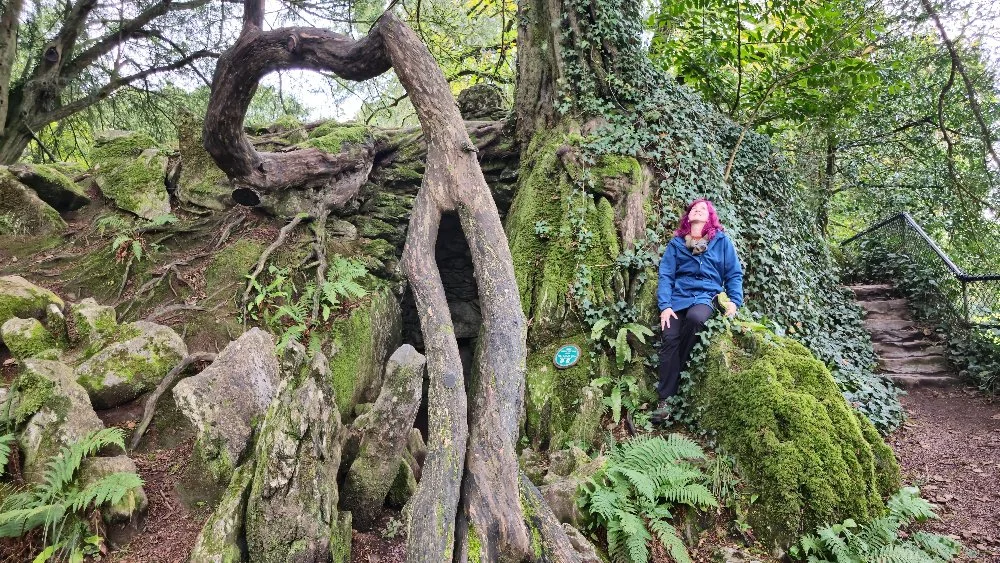The Surprising ‘Inner Journey’ of Face Yoga
When I first started practicing face yoga, I was in my early 50’s, perimenopausal, and not feeling all that great about myself. I had started putting on a little weight and was noticing changes in my skin and face that I didn’t really love. I expected (ok, well, I was hoping) that it would change the way I looked—giving me more toned muscles, a lifted look, a brighter, smoother complexion.
What I didn't expect was how profoundly it would change my entire relationship with myself.
To my surprise, adopting a regular face yoga practice turned out to be as much an inner journey as an outer one.
It began subtly. In those early days of learning the various exercises, massage techniques and acupressure points, I had to study my own face with a different kind of attention than I was used to. Instead of the usual quick scan for "flaws" to fix, I was watching to see how my muscles moved, where I was holding tension, and how I formed different expressions.
Over time - and without my really being conscious of it - this shift in perspective gradually transformed how I saw myself as a person.
What I discovered is that it's nearly impossible to practice face yoga from a place of self-criticism. The very nature of the practice asks you to work with your face instead of against it, to understand its unique structure and patterns, and to begin to appreciate complexity and interconnectedness of your 57 amazing face, head, and neck muscles.
In other words, face yoga subtly guides you toward a more compassionate relationship with your reflection.
There was actually one particular moment that kind of crystallized this shift for me…
I was practicing in front of the mirror, working on an exercise for the forehead, when I realized I was unconsciously softly smiling at myself—not the over-happy smile of someone taking a selfie, but a genuine smile like one you might direct toward a friend.
When was the last time you smiled at yourself with genuine warmth?
For too many of us, our relationship with our reflection is adversarial. We approach the mirror with criticism, disappointment, even dread...especially as we move into midlife and beyond. We focus on perceived flaws rather than the miracle of our unique faces.
Face yoga gently disrupts this pattern. It asks us to touch our faces with care, to observe without judgment, to work with what is to make it the best it can be.
My client Kim expressed this perfectly. After practicing for a few months, she told me: "I used to avoid looking in the mirror unless I was putting on makeup. Now I actually look at my own face and I notice things I never saw before—not just 'problems' but other qualities that make me unique."
I think this shift from criticism to curiosity and from rejection to acceptance is probably the most profound gift of the practice.
But the coolest thing of all is how this inner shift often accelerates the visible results of your face yoga practice. When we release the chronic tension that comes from self-criticism and learn to hold our faces with greater ease and confidence, we naturally look more vibrant and relaxed, no matter how old we are.
It's a beautiful paradox: when we stop fixating on looking better and instead focus on feeling better in our skin, we often end up looking better as a natural result.
Now, I want to be clear—I still have days when I look in the mirror and see things I'd like to change. Self-acceptance isn't a destination we reach once and for all; it's a practice we return to again and again.
But, especially now that I am beyond menopause, face yoga has given me a pathway back to self-appreciation on those harder days. A way to reconnect with my face through touch and movement rather than remaining stuck in critical thoughts. (It's also given me the know-how and the tools to actually make real changes if there are things I don't like.)
Think about how different our experience of aging might be if we approached our changing faces with curiosity and care rather than resistance and fear. If we saw our faces as worthy of attention and nurturing, regardless of their age or appearance.
That kind of self-acceptance radiates from the inside out, creating a beauty that no product or procedure can replicate.

